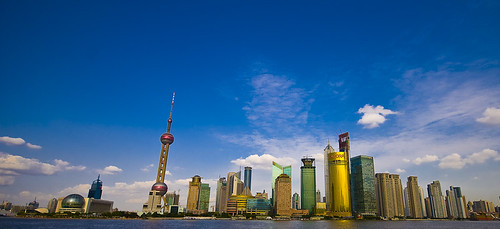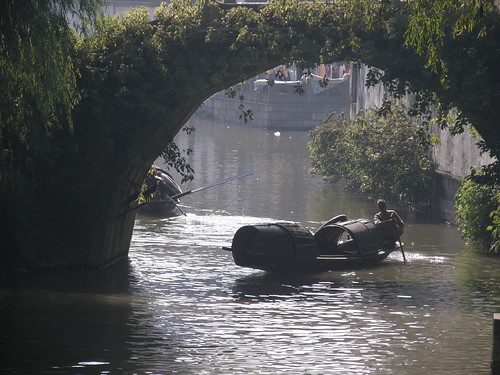Last night I was watching the season premiere of 30 Rock. In the episode Jack says that their television show has lost touch with “Real America” to which Liz responds “all of America is real” . This comment is of course ignored as most of the rest of the episode is spending trying to reconnect with the heartland of America, including a part where Jenna signs a country song for NBC’s Tennis coverage that says “Kiss my ass New York, it’s tennis night”.
Sure their shirking of major cities in favour of a rural demographic was mostly done in jest, but it really rings true to how we treat China. How many people do you hear refer to Shanghai or Tianjing as not “REAL China”, or mention some small town in Anhui or Hunan as a great example of “REAL China”?
In my short time here I have really gotten confused as to what exactly in this country is real, and what is fake. I think that I used to know what constituted “real China” but the more layers I peel off in my search to learn more about this place the more confused I am.
My current home away from home is in the rapidly expanding Suzhou Industrial Park (SIP), which a scant decade and a half ago was little more than farmers fields and rice paddies. There are wide lanes with bike paths, tree lined avenues, and English signs everywhere. It seems to be the very antithesis of the idea of “REAL China”. However, the more Chinese cities I travel to the more neighbourhoods I notice that look just like my own, with their Starbucks and Western amenities. I feel like I have been to Chengdu’s CIP, Qingdao’s QIP, Wuxi’s WIP, and Urumqi’s UIP, sure those may not be the real names of the areas, but it is so similar to my neighbourhood it is easy to get confused.
If these modern new Western style districts are popping up all over the Middle Kingdom how can they not be “REAL”?

I had the pleasure of spending part of my holiday trekking through Yunnan’s Xishuangbanna region. During that trip I ended up visiting a variety of Dai and Blang villages where a number of the local did not even speak Mandarin let alone English. After I returned I spoke highly of my experiences on this trip and many of my colleagues said that I had left China.
Now just because a place has little to no Chinese language or culture is it somehow not a part of “REAL China�
What I’ve come to realize is that “REAL China†exists in only two places: history books and in the minds of foreigners.
All we ever seem to read about China is how quickly it is modernizing and how much the economy is booming. Since this is really happening, the consequences like new, modern neighbourhoods must also be real, or “REAL†if you will.
China is far more of a melting pot or mosaic than most lao wais give it credit for. Approximately 10% of the population

of China is part of a non-Han minority. While that seems like a small amount, it should be noted that 10% is around 130 million people. That’s triple the population of Canada. Are these people somehow not “REALâ€?
Also the urban population of the country is up to 54% (in 2008, up from 46% in 2001 according to Wikipedia) thus making places like SIP and all the other IP’s quite commonplace, and therefore quite “REALâ€.
This disdain for development was quite apparent last spring with the demolition of much of Kashgar’s old to “REAL Kashgar” was being destroyed in the name of modernization. I had the pleasure of being in Xinjiang just before the bulldozer’s started on their way, and while the old town was fascinating, I certainly can not blame the residents for their decisions to move. While living in a home that is centuries old has its appeal, I would still sooner take such modern amenities as running water and insulation over the novelty or tradition. My house back in Canada in no way resembles the lodgings of the pioneers but that doesn’t mean that it is any less “REAL” or some part of my ancestors heritage was destroyed now does it?
So just like in 30 Rock the assertion that the East Coast is not part of “Real America†is asinine it is equally foolish to say that any part of this country is not part of “REAL Chinaâ€. Just like the United States is made up of New York, Nebraska, and New Mexico, China is made up of Shanghai, Shaanxi, Xinjiang, and everything else in between. The sooner we start to realize this the better we will be able to try to make sense of this fascinating nation.








Nice post. I think that most of what the tourism industry would highlight as authentic Chinese culture is a bit hokey these days anyway – preserved old towns and such. But as in a comment thread a couple of months ago and a conversation we had a few weeks ago… how can it be fair for some villages to not have indoor plumbing just so a few tour buses can stop by and marvel at the quaint little village people?
On the other side, very true that we can’t dismiss the new development as “not real China.” This is what China is so proud of, the “new China,” as evidenced by the pomp and circumstance of the PRC anniversary parade. But the boundaries are a little blurred here – I am referring specifically to new development, not necessarily expat neighborhoods. Though I’m aware that the two overlap by a lot.
That said, if I had a few weeks to travel and see China, I wouldn’t make it a point to visit these new development neighborhoods. Seeing them and knowing they exist is a valid point but part of traveling is having the opportunity to experience local culture. Where do I get a dish of the local specialty? Where do the locals shop? What are some sights that they are proud of? These are things that a new district probably wouldn’t have as much of.
I guess that’s always the dilemma for any culture with a long history. How to combine the old and the new?
Come on. Of course Canadians aren’t real. They’re just pseudo-Americans. Zing!
I’d like to add that “real” China is not only in history books and the minds of foreigners. It’s in the minds of Chinese as well.
I went from Shanghai to Nanjing to Changzhou and back to Shanghai in the time I’ve lived here, with a handful of other places as removed from the Yangtze as Ãœrümchi, Beijing and Xi’an as travel destinations. I say it’s all real, nowhere less than anyhwere else.
Simple – people believe that they want to believe
Correction on above – People believe what* they want to believe
Pingback: Tweets that mention Searching for Real China | Lost Laowai China Blog -- Topsy.com
@Someone – people also believe what they are sold to believe…
Nice post, Glen. When people, whether foreign or Chinese, invoke “real China” or “real” anything, I like to think that, most of the time, it’s innocent nostalgia and sentimentality. It’s good to recognize and remind ourselves that change is “real” too, and not in of itself damnable.
I would interpret “real China” as “not expat ghetto”- and in that respect, it’s not defined by location, socio-economic class, architecture, amenities or age. It’s more about attitude: Are you going to engage with China, or ghettoise yourself?
I think people say ‘real china’ when they really mean traditional China or historical China. Because like your quote about America from the show, everything in currently in China is really part of that which is China… expat ghettos and all.
Pingback: East is Relative » Blog Archive » Philosophical thoughts, part 1
I just posted something similar to my personal China travel blog – people telling me that Shimen, the small town in Hunan where I live and teach, is the “real China,” is like someone saying that DeKalb, Illinois is the “real America.” The “real China” term was used in my teacher training as a way to change our expectations of our living situation rather than invalidate an experience, but it’s still an ineffective label.
Gotta go with Chris. The real China is anywhere real Chinese people work, live, or play, whether it’s the Bund in Shanghai or tiny villages in Sichuan.
I’m a latecomer to this conversation, but here’s my 2 fen anyway… What is real? Where is the real?
Of course everything is real and everywhere is real. But the question and the quest reveal more about the zeitgeist than anything. Modernization ushers in more and more feelings of disconnection from tradition and nature. Case in point: One of my students told me that she can appreciate nature more by taking a picture of it with her cell phone/camera. Would she be able to enjoy nature if she couldn’t recharge its battery? Adverts, credit cards, television, and all the pretty modern infrastructure rapidly thrown up in a pellmell rush all contribute to a sense that humanity is living in a field of dreams – an illusion easily dispelled by even the slightest misfortune. So when people say they looking for the real China, I think they searching for authentic experience – stuff that cannot be bought in a mall or provided by a touring group. But then again, maybe not. Maybe I’ve watched the Matrix films way too many times.
I don’t think I like the “real China” label. It all seems like China to me. Some places are quite Westernized and that gives them a different feel. I’ve been to the SIP, my dad lives there, and to me that feels luxurious. I live in a city/town outside of Chengdu where I can’t get imported goods or Starbucks coffee, but I still consider places that have those things to be China. I like where I live being almost totally immersed in Chinese, but sometimes I think it would be nice not to ride a bus for 1.5 hours to get imported goods. Good thing I like the Chinese food!
When my wife and I decided to travel around and see China – not realizing that unlike other countries – China is a World in its own!! – Coming from Canada – it was SO different. My wife and I wanted to see the true China.
In our experiences, Chinese people are generally very friendly and helpful to foreigners. Honest most of the times also (but in big cities like Shanghai, Beijing, Xi’an etc. you need to be careful). After much research and struggle I came across a Canadian tour company that made our travel and life simple. Unlike other companies – they were not out just make a buck or two from us – being quite sincere and helpful – also charged us much lower than everyone else – their service is quite personal and pretty good. Maybe any of you can get intouch with them – if you are looking to travel and see the REAL China. The person we deal with is Ms.Gloria and their website is http://www.realchina.ca – interestingly their company name IS ‘realChina’. 🙂
Pingback: Fact or Fiction X: Moving On Up | Lost Laowai China Blog